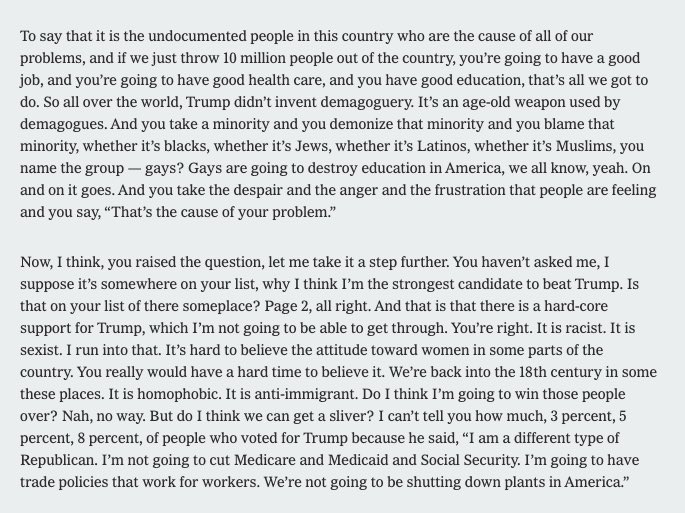MG: Senator, why hasn’t your candidacy gained broad support among African-Americans?
Well, a couple of reasons, but check that out. I think sometimes — without going through the whole — what happened in 2016 is, we were running against a woman, who — she and her husband were very popular in the African-American community. But even in 2016, we won the support of African-Americans who were under the age of 40 and Latinos. And right now that is still the case. In fact, poll after poll has us winning the support of people under 49.
We’re not doing well with older people. I’ve got to work on that. But I don’t accept the fact that we’re — I mean, I’d like to do better. But we are not. And Joe Biden is doing well, and there are reasons for that. But I think behind Joe, we are in second place within the African-American community. I suspect we’re winning among younger African-Americans.Senator Sanders is a favorite among black millennials, but by a small margin. Mr. Biden is leading him in support among all black voters by nearly 20 percentage points.
KK: Why is Biden doing so well?
And I should also tell you that I just came back from South Carolina yesterday. We have more African-Americans support in the State Legislature than any other candidate. We had nine members of the State Legislature who are supporting us. Actively supporting us. We have — I don’t know enough about other campaigns, but we have a whole lot of people like Cornel West, Nina Turner, Danny Glover, many others. Leading African-American voices that are out there campaigning very, very hard for us. I think we will surprise people about how well we do in South Carolina, for example.
MG: So, you’ve declined to support reparations. What, if anything, should the federal government do ——
Good.
MG: — to address the condition —
Good.
MG: — specifically of black Americans after centuries of discrimination, exclusion and plunder, frankly?
Yes. You’re right. It’s not that I have rejected reparations.While Senators Elizabeth Warren and Cory Booker said they supported some form of reparations, Senator Sanders has been typically contrarian on the issue — he said that “there are better ways” to help black communities “than just writing out a check.” I am on Cory Booker’s bill in the Senate, which looks at reparations. I’m a co-sponsor of that. Strong co-sponsor of that. What I believe is, you’re absolutely right. And that means I am sympathetic to what Jim Clyburn of South Carolina, was talking about. I don’t know if you’re familiar with what Clyburn is talking about. It’s called the 10-20-30 legislation and what it says is, the federal government must substantially increase funding for distressed communities that have long-term poverty rates. Often, not always, African-American communities. And that means a significant increase in federal funding for housing, for education, for health care, for infrastructure, for job training.
You’re absolutely right. There is no argument. They’re all community, African-American community. We don’t even have to go into all the horror that that community has experienced, and that has got to be addressed and we intend to address it, in an extremely bold way. That’s a promise I make to you.



 i called biden/beto like a year ago
i called biden/beto like a year ago

